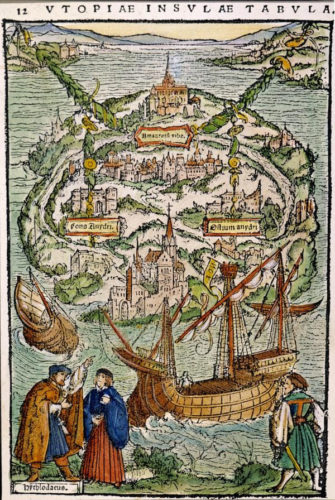This week’s blog post is about the concept of “utopia”. I’ve run this session with youngsters and adults at www.giftcourses.co.uk and it features in the November programme for www.p4he.org Here is some context and key questions.
A utopia means a perfect world. It comes from the book, Utopia, written in 1516 by Sir Thomas More, who was Lord Chancellor (most important official) to King Henry VIII. His book describes an imaginary island that in many ways was the opposite of the real world he lived in, and later (and earlier) writers have critcised their own times and imagined the opposite.

1. What were some of the worst things about Tudor times (or about King Henry VIII) that you think Sir Thomas More might have wanted to imagine away?
If you thought of war, greed, religious hatred (Catholics and Protestants burning each other at the stake etc.) and some people living in luxury (such as the famously fat and expensively dressed Henry himself) while the peasants were half-starved, you’d be on the right track.
Sir Thomas’s Utopians hated war and tried to avoid it. They shared their property. They cared so little about gold, they used it to make chamber-pots (toilets before there were toilets).
They had four different religions, each of which let the others worship in peace. They even prayed that if their religion was wrong, God would let them know! Accepting that your religion might not have all the answers is very different to burning others at the stake because they don’t think the same as you!
2. If you think about the problems of the world today, what are some of the things you would wish away? I think we can all agree on coronavirus, but what else?
What would a utopia that was the opposite of those things, be like?
The twist in the word “Utopia” is that while it’s a word that Sir Thomas More made up, to mean a perfect world, it is made up of two Greek words that already had the meaning of “not” and “place”. So Utopia really means “not-place”, or somewhere that could never exist.
3. Do you think that your utopia is a “not-place” that could never exist? Or are there some things about it that could ever happen for real? If so, how?
Rather than utopias, twentieth century writers were more interested in, “dystopias”, worlds very different to ours but for the worse, not the better. But they’re not quite opposites. Sometimes, the stories involve one extreme coming out of the other, a bit like a clock ticking past 12 and going back to 1.
4. Can you see any ways that your utopia could go too far and turn into a place that was worse, not better, than the world we live in?
Best wishes,
Jason
PS. As coronavirus drags on and schools balance training with staff fatigue and the perils of adults gathering in the same room, some schools are giving staff INSET days off and instead arranging Zoom twilights – join from home, after school, cup of tea in hand. Email for details.